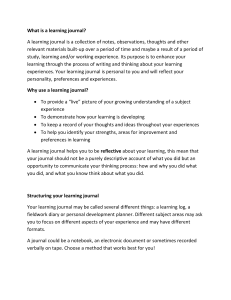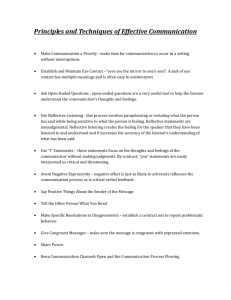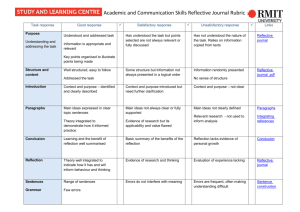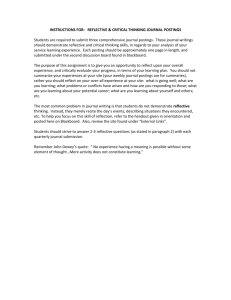Reflective Writing - York St John University
advertisement
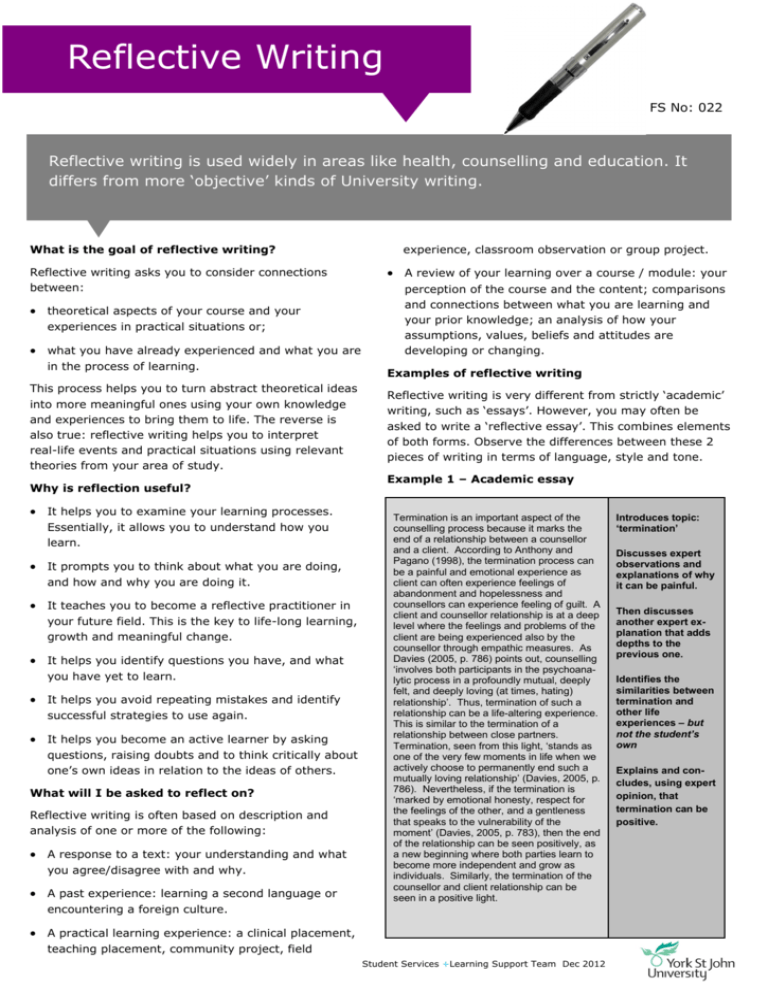
Reflective Writing FS No: 022 Reflective writing is used widely in areas like health, counselling and education. It differs from more „objective‟ kinds of University writing. What is the goal of reflective writing? Reflective writing asks you to consider connections between: theoretical aspects of your course and your experiences in practical situations or; what you have already experienced and what you are in the process of learning. This process helps you to turn abstract theoretical ideas into more meaningful ones using your own knowledge and experiences to bring them to life. The reverse is also true: reflective writing helps you to interpret real-life events and practical situations using relevant theories from your area of study. Why is reflection useful? It helps you to examine your learning processes. Essentially, it allows you to understand how you learn. It prompts you to think about what you are doing, and how and why you are doing it. It teaches you to become a reflective practitioner in your future field. This is the key to life-long learning, growth and meaningful change. It helps you identify questions you have, and what you have yet to learn. It helps you avoid repeating mistakes and identify successful strategies to use again. It helps you become an active learner by asking questions, raising doubts and to think critically about one‟s own ideas in relation to the ideas of others. What will I be asked to reflect on? Reflective writing is often based on description and analysis of one or more of the following: A response to a text: your understanding and what you agree/disagree with and why. A past experience: learning a second language or encountering a foreign culture. experience, classroom observation or group project. A review of your learning over a course / module: your perception of the course and the content; comparisons and connections between what you are learning and your prior knowledge; an analysis of how your assumptions, values, beliefs and attitudes are developing or changing. Examples of reflective writing Reflective writing is very different from strictly „academic‟ writing, such as „essays‟. However, you may often be asked to write a „reflective essay‟. This combines elements of both forms. Observe the differences between these 2 pieces of writing in terms of language, style and tone. Example 1 – Academic essay Termination is an important aspect of the counselling process because it marks the end of a relationship between a counsellor and a client. According to Anthony and Pagano (1998), the termination process can be a painful and emotional experience as client can often experience feelings of abandonment and hopelessness and counsellors can experience feeling of guilt. A client and counsellor relationship is at a deep level where the feelings and problems of the client are being experienced also by the counsellor through empathic measures. As Davies (2005, p. 786) points out, counselling ‘involves both participants in the psychoanalytic process in a profoundly mutual, deeply felt, and deeply loving (at times, hating) relationship’. Thus, termination of such a relationship can be a life-altering experience. This is similar to the termination of a relationship between close partners. Termination, seen from this light, ‘stands as one of the very few moments in life when we actively choose to permanently end such a mutually loving relationship’ (Davies, 2005, p. 786). Nevertheless, if the termination is ‘marked by emotional honesty, respect for the feelings of the other, and a gentleness that speaks to the vulnerability of the moment’ (Davies, 2005, p. 783), then the end of the relationship can be seen positively, as a new beginning where both parties learn to become more independent and grow as individuals. Similarly, the termination of the counsellor and client relationship can be seen in a positive light. A practical learning experience: a clinical placement, teaching placement, community project, field Student Services +Learning Support Team Dec 2012 Introduces topic: ‘termination’ Discusses expert observations and explanations of why it can be painful. Then discusses another expert explanation that adds depths to the previous one. Identifies the similarities between termination and other life experiences – but not the student’s own Explains and concludes, using expert opinion, that termination can be positive. Example 2 – Reflective journal The issue of termination is an important aspect of the counselling process because it marks the end of a relationship between a counsellor and client. Although I have never been in a counselling relationship where the termination process was an important factor, I can relate this process to that of a break-up with my partner when he moved abroad. We both had feelings of dependency on each other and had a mutual care for each other, but knew that we could not continue on with the relationship because basic contact would be too emotionally difficult. Similarly, a client and counsellor relationship is at a deep level where the feelings and problems of the client are being experienced also by the counsellor through empathic measures. Thus, the termination of such a relationship can be a life-altering experience. Nevertheless, if both parties respect each other and are honest in voicing their reasons for ending the relationship, as it was in my case, then the end of the relationship can be seen positively, as a new beginning where both parties learn to become more independent and grow as individuals. I feel that my experience was quite similar to a counselling relationship in that we were both on the same level without one party being subordinate to the other and the complete separation ultimately helped me to grow as a person. Present tense is used when making general comments, or discussing theories or course concepts. Introduces topic: ‘termination’ Discusses own lack of experience with termination specifically, but tries to relate it to own experience of a romantic breakup. Future tense is used towards the end to speculate on actions that can/should be taken in the future In the examples below, see how tenses and pronouns are used, depending on the purpose. Notice too, that the writing should still adhere to academic conventions e.g. making reference to academic texts as required. How do I start my reflective writing? Explains in detail why the two might be similar. Again relating termination to a romantic relationship, student discusses how endings can be positive. You base your reflective writing on a reflective thinking process. The reflective thinking process starts with yourself! Reflection involves taking a pause to examine your own thoughts, beliefs, values, attitudes and assumptions, which form the foundation of your understanding. Revisit your prior experiences and knowledge, and consider how you think and why you think the way you do. Some guiding questions for reflective thinking are: What was my role in the event? Why did I adopt that role? Concludes by stating, overall, why the relationships are similar. Tense and pronouns in reflection What happened during that experience? And why did it happen? What were my feelings? And why did I feel that way? What were my thoughts during that time and why? Reflective writing concerns your thoughts and actions, so it is usually presented in a more informal or personal style than a traditional academic essay. It is okay to include personal and subjective comments and use personal pronouns, such as “I did”, “I thought” or “I felt”. How can I learn from this experience? Reflective writing also requires the use of past, present and future tenses: would be the likely result? Past tense is used when recounting a particular experience or incident ‘Models’ of Reflection Examples of the use of tenses: We were both dependant on each other and had a mutual care for each other, but knew that we could not continue on with the relationship, so we terminated the relationship, so to speak, because basic contact would be too emotionally difficult. The issue of termination is an important aspect of the counselling process because it marks the end of a relationship between a counsellor and client. In my future practice I will need to adhere to the principle of respect for patients regardless of their age, occupation and cultural background. Nevertheless, if the termination ‘is marked by emotional honesty, respect for the feeling of the other, and a gentleness that speaks to the vulnerability of the moment’ (Davies, 2005, p. 783), as it was in my case, then the end of the relationship can be seen positively, as a new beginning where both parties learn to become more independent and grow as individuals. What theories or ideas can I apply to it? How do I interpret what I experienced or observed? How could I have done things differently and what The following are popular models to guide critical reflection: Kolb‟s Learning Cycle Gibbs‟ Model of Reflection Johns‟ Model of Structured Reflection Remember! What is important is your reaction to the experience, and how it has shaped your thinking and learning. What your lecturer is looking for is how well you can analyse and reflect on an event in order to learn from them, and how well you are able to relate your study of theories to real-life situations and practices. Student Advice Team |T: 01904 87 6477 | E: studentadviceteam@yorksj.ac.uk


